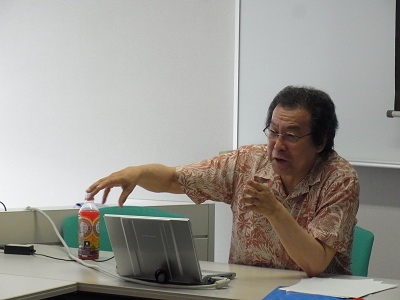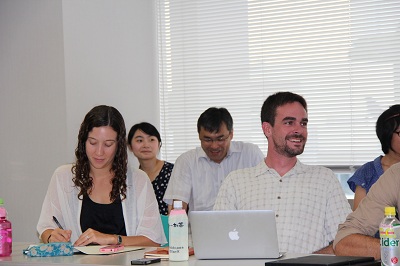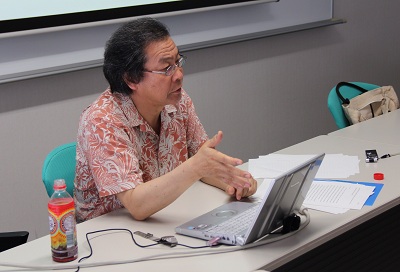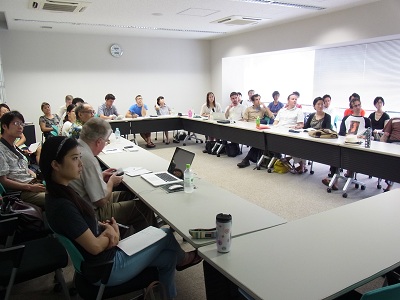[Report] UT-UH Summer Institute for Comparative Philosophy (5)
On August 14th, at the halfway of the three weeks seminar, we had an exciting lecture by professor Yasunari TAKADA at Komaba. The report written by Ms. Amakawa will tell us how Mr. Takada addressed the question that may make you feel awkward --"How to be a Perfect Japanese".
The lecture held on August 14th was titled "How to be a Perfect Japanese," and regarded the dependent nature of the Japanese culture or, to use the Japanese term, the culture of amae. The primary scholars that Professor Takada referred to in his lectures were Terada Torahiko, Kato Shuichi, Izutsu Toshihiko, and works included The Anatomy of Dependence by Doi Takeo and The Chrysanthemum and the Sword by Ruth Benedict.

Taken directly from the lecture, the following steps are essential if wanting to become a “perfect Japanese”:
• Try to find out the forces and workings of the super-ego in yourself. They are often related to the imperative ideas such as “truth,” “justice,” rights,” and “conscience.”
• Then try to weaken them as much as possible, by taking it to heart that nothing is more important than personal relations, in which other persons come first in everything. Since you owe everything to them, it is impertinent that you express your own opinion. Be conformist.
• But do not forget to demarcate from strangers those intimate fellows who form your inner circle, indispensable for your “amae” existence.
• Remember that your personal obligations in your internal circle are far important than such universal ideas as human rights and social contract.
• Try to be at one with nature, abandoning the subject/object dichotomy.
• Consider that everything is “natural” including those which are considered “man-made” (factum) in the West, including history, nation-states, politics, and disasters caused by human error.
• Don’t be well-planned: you don’t have to worry much about the consequences of your action.
• Carpe diem hic et nunc (Seize the day here and now).
A point of criticism to be made here was brought up after the talk in the form of a question: “How can we avoid essentializing the Japanese culture?” Analyzing and observing the way the members of this culture conduct themselves only strengthens the urge to question why the Japanese do things the way they do, and how the culture is so different from any other. Perhaps works like the ones listed above are problematic due to the very nature of their existence. In response, Professor Takada argued that if we do not essentialize, we cannot be critical; this is simply a method that allows us to discuss topics of this sort.

To step aside from critiquing the Japanese culture, let us take notice of the final bullet point that Professor Takada brought up: the Here and Now. The Here and Now was introduced in this lecture and in many others, and served as an indispensable theme of this Institute.
So, what is the Here and Now?
As told by a monk encountered during our weeklong trip, the concept of Here and Now is as follows:
“Let’s say you are seated at a restaurant and the waitress brings your table glasses of water. You look down and notice your glass is chipped. Your initial reaction would be to get mad, but this,” he says, “is only because this situation is inconvenient for you. In other words, it is you who is judging the situation as a negative one. If you take a mirror as an example, a mirror reflects your every move—it will simply take you as you are without judgment. A mirror will not decide one day that it does not like you and, consequently, stop reflecting you. Zazen is an attempt for us to be like mirrors; we must take things as they are without judgment or a critical mind.”
Another way to understand the Here and Now, is in the way of that mentioned in Professor Kobayashi’s lecture of “Carpe diem hic et nunc,” or “Seize the day, here and now.” In contemporary culture, this phrase is perceived as encouragement to dare oneself to attempt bizarre undertakings, but its original purpose was to convince people of not entrusting the future to fall into place for itself; action must be taken today if we want to make our lives better.

The message extracted from the different schools of thought lauding the Here and Now does not seem to be about enjoying the moment, nor about living and loving life to the fullest—it instead utters the importance of preparation. Uncanny connections can also be made to the popular idea of deliberate practice in which we “never succeed unless learning the Way is the most important thing in our lives” (Zen Master Dōgen’s Shobogenzo).
Whether this holds true in the context of becoming a “Perfect Japanese” is an interesting point of discussion. Although I cannot draw a conclusion that asserts the validity of either side, the possible adherence to the Here and Now of other perspectives insinuates that perhaps no concepts of Here and Now are necessarily alike; they are alike only because they are being essentialized to the same point.
But, as professor Takada said, we need to essentialize in order to discuss. In the end, we arrive at the beginning.

The sort of ideas and thoughts encountered in this Summer Institute, including the above stated, are not only those that contribute to a better understanding of problems encountered in our current day in age (including but not limited to natural disasters such as the 03.11 earthquake and tsunami, cultural differences, etc.), but also to a better understanding of ourselves as individuals. The “Here and Now” is one of the themes of this Institute that promoted this sort of thinking, and was revisited many a time, one instance being Professor Kobayashi’s lecture. The opportunity to learn not only from scholarly writings, but from the point of view of Zen Buddhist monks themselves provided us with irreplaceable experiences that deemed this Institute unforgettable.
(Tomomi A Amakawa)






